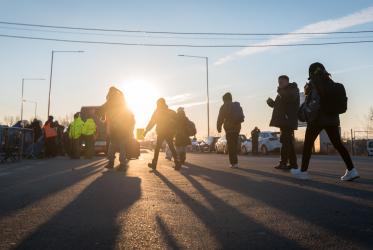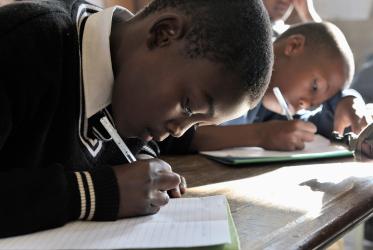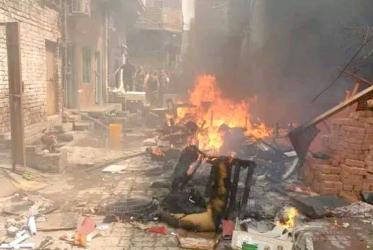World Council of Churches
EXECUTIVE COMMITTEE
Bossey, Switzerland
17-20 February 2009
Background
- The Democratic Republic of Congo (DRC), the third largest country in Africa, is the embodiment of human pain. War in the DRC has taken a terrible toll as some 4.3 million people have died in the last five years and over 14 million Congolese are malnourished because of the protracted conflict. Aid workers have suffered attacks forcing them to suspend activities in parts of Congo, leaving many displaced persons without assistance - OCHA estimates that perhaps 70,000 people from the latest wave of displacement may not be receiving international assistance.
- An estimated 40 per cent of those killed are women and children. It is believed that upwards of 1,000 women are brutally raped each month. There is deliberate physical mutilation of their reproductive organs, sometimes with the use of guns as a way of purposely annihilating and exterminating any future population. The women are often left emotionally scared. There is almost no medical care available for them. They are isolated from others.
- Reports from the field talk of widespread looting, attacks on civilians and forced conscription into armed groups. The tortured DRC continues to generate blood fortunes that swell the coffers of some architects of globalization and a consortium of international criminals who supply arms in exchange for minerals. DRC's tropical forest, the largest in Africa, provides safe haven for rebels from neighbouring countries. These countries have felt justified in crossing into DRC in pursuit of the rebels to safeguard their own national security.
- The minerals of DRC include large deposits of diamonds. The radium of DRC represents 60 per cent of the resources used in the West. Apart from Russia and Canada, the only other worthwhile global source of cobalt is DRC. Some 40 per cent of the global supply of coltan, necessary for the manufacture of mobile telephones, comes from DRC. The confiscation of its mineral wealth has meant that the land of DRC, from the colonial era onward, has never truly belonged to the Congolese people. The nation has never been able to extricate itself from the grasp of its brutal history. The Belgian colonial rule perpetuated the deliberate plunder of natural resources.
- Political History--King Leopold II of Belgium ran Congo as a private estate and oversaw the estimated deaths of millions and the mutilation of others as part of a pattern of coercive tactics to gain cheap labour. Patrice Lumumba, first Congolese Prime Minister, was assassinated on January 17, 1961, reportedly with the collusion of Belgium, the USA and other western powers. Mobutu Sese Seko's rule was a dictatorship marked by untold human rights violations. Under Mobutu, the Congolese endured misrule for 30 years. He survived in power with the help of the United States who provided him with more than $300 million in weapons and $100 million in military training. Laurent Kabila overthrew Mobutu in 1997 following the end of the Cold War. Kabila was assassinated in January, 2001. His son, Joseph Kabila, was installed as president while at the same time ethnic militarism was transforming the eastern region of DRC into a patchwork of warlord fiefdoms. One of the notable forces supporting Joseph Kabila today is the Mayi Mayi militia movement, a loose association of traditional Congolese "defense" forces.
- The church/state relationship in the DRC has a chequered history. At times the church has been very close to the state; at other times the church has kept a distance between politicians and hierarchy. There also have been historical moments when sections of the church have been the fiercest critics of the state. Upwards of 80 per cent of the DRC population of 65 million is Christian; therefore, the state cannot entirely ignore the voice of the church. This is especially true because the church provides more humanitarian resources to the people (health, education, food) than the state ever did, whether during the colonial or post-colonial periods. Yet the church's prophetic role has not been as effective as it should have been, for the church has failed to speak with a unified voice on the socio-political conditions in the country.
- In recent years, the church has given insightful leadership in the national debate on the future of DRC. The churches and local and international ecumenical organizations have also stepped up their solidarity and involvement. ACT International as well as a number of specialized ministries from Europe and North America has increased the humanitarian and diaconal work.
- With the joint goals of pastoral care and listening to the churches in the DRC, a group of church leaders visited the country earlier this year, led by Archbishop Bernard Ntahoturi, Anglican Archbishop of Burundi. Ntahoturi chairs the Council of Churches of Burundi, the Great Lakes Ecumenical Forum and is a member of WCC Central committee.
- Churches in Congo are working to alleviate the humanitarian crisis, promote a peaceful resolution to the conflict and advocate for and end to the violations of human rights. While many aid groups work to assist those in camps for displaced people, local members of Action by Churches Together (ACT) International are helping the largely "invisible" displaced families - those who are not in camps but sheltered in families' houses - and the increasingly vulnerable communities who are hosting them. Initial plans for assistance include support for an estimated 60,000 people, as well as water and sanitation support for significantly more families.
- As of December 2008, it is estimated that nearly 250,000 people have fled their homes in the eastern part of the DRC escaping the fight that broke out between the army and rebels in August. These people have joined the one million who fled in previous rebellions. The rebels say that they fight to protect the Congolese Tutsi community from being attacked by Rwandan Hutu rebels who fled to DRC. Some have fled after having perpetrated the 1994 Rwandan genocide. For a long time the Congolese government failed to stop the Hutu forces from using its territory. The situation would change due to a new development which has two important aspects; peace talks under the chair of the UN Secretary General's special envoy, General Olusegun Obasango, the former president of Nigeria, of which a second round of talks took place in Nairobi, Kenya in January 2009; and the combined forces of the DRC and Rwandan armies whose main objective is to disarm the Rwandese rebels in the DRC.
The WCC Executive Committee, meeting at Bossey 17-20 February 2009:
Welcomes the Goma and Nairobi meetings which revived the peace talks that served toward seeking unity of common purpose with neighbouring countries in order to enhance human security in the Great Lakes region and commends the political leaders committed to these processes.
Applauds the Congolese churches for their steadfast pursuit of dialogue and for taking a frontline role in leading the civil society in the process of inter-Congolese dialogue, accompanied by the All Africa Conference of Churches (AACC) and FECCLAHA (Fellowship of Councils and Churches in Great Lakes and the Horn of Africa).
Encourages the one ecumenical family to accompany and support the Congolese churches as they engage in the daunting task of advocacy for rehabilitation of the state, with particular attention to its functions and authority, good governance and national sovereignty, as well as to the healing and reconciliation of all people impacted. Dialogue and healing among communities must include the war-torn eastern region.
Condemns the atrocities and wanton destruction of property, committed particularly in the mineral-rich eastern Congo, as well as condemning the plunder of Congo's natural resources which has contributed to turmoil in the country.
Challenges the international community to step up humanitarian and technical support for national reconstruction, helping to stimulate and guide socio-economic restitution for the people of DRC who have been cheated of their wealth through systematic international plunder of natural resources which should be destined for the well being of the Congolese people.
Urges international support for the Congolese churches, the people of DRC and civil society as they pursue sustainable peace and national reconciliation through the promulgating and reconciling of laws toward these goals.
Calls on the African Union and the United Nations to be actively involved and to monitor peace initiatives in DRC and to support the people of Congo in pursuing present and future opportunities for peace and reconciliation.
Urges the UN Security Council to strengthen and reinforce the arms trafficking embargo as well as monitoring illegal arms transfers especially in eastern Congo by increasing the monitoring and pressure on the international community to comply with the measures outlined in Security Council Resolution 1807.
Calls on UN agencies and bodies to implement UN Security Council Resolutions 1325 and 1820 concerning Women and Peace and ending Sexual Violence and to provide resources, programming and technical expertise to end impunity for those responsible for sexual violence in the DRC. Also to increase resources and capacity of the UN to accompany and provide health and healing services to victims of sexual violence and ensure initiatives to end sexual violence are integrated in all peacekeeping and peace-building initiatives in DRC.
Calls on the United Nations to continue with peacekeeping efforts by revising the mandate of MONUC to include more practical and concerted efforts especially in East Congo while at the same time expanding peacekeeping presence to other conflict areas and to implement an institutionalized approach to disarmament and demobilization throughout the country.
Mourns the death of Dr. Des Forges, who died tragically in the 13 February, 2009 airplane crash near the Buffalo, New York, USA. Des Forges was one of the leading experts on the human rights violations in the DRC, Rwanda and Burundi. As a result of her research and 20 years of work at Human Rights Watch in which she testified 11 times at the International Court Tribunal, her efforts are credited with bringing credibility to the charge of genocide in the region.
Prays for the family and friends of Dr. Des Forges and especially for the untold millions who have suffered and continue to suffer the ravages of this despicable time in our history.



